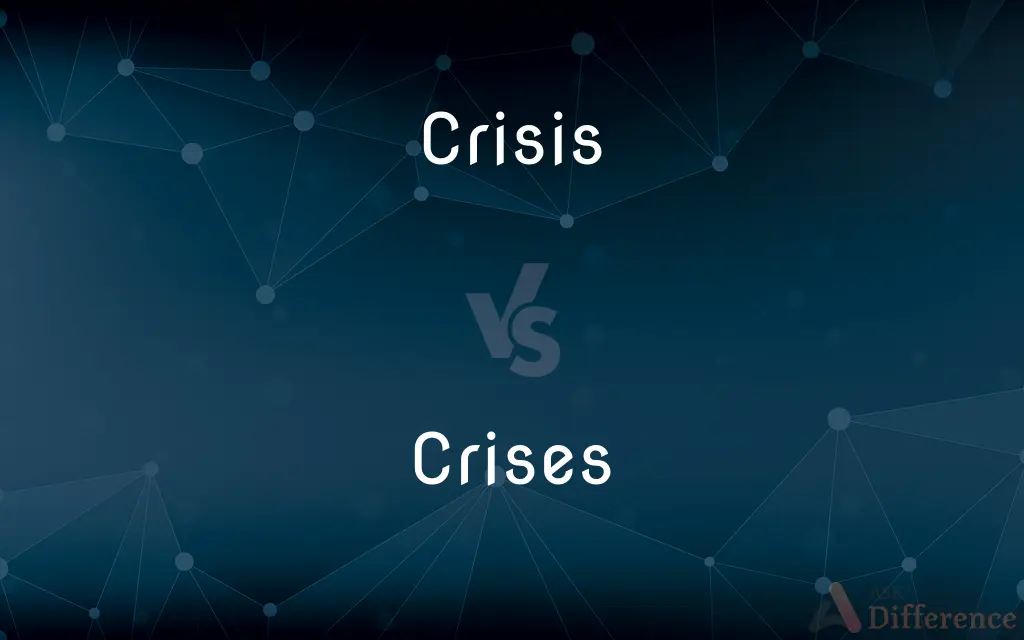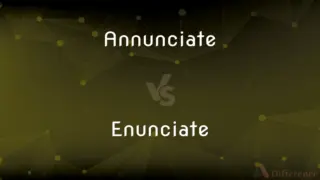Crisis vs. Crises — What's the Difference?
By Tayyaba Rehman — Updated on April 9, 2024
"Crisis" refers to a singular critical or unstable situation, while "Crises" is its plural form, indicating multiple such situations.

Difference Between Crisis and Crises
Table of Contents
ADVERTISEMENT
Key Differences
"Crisis" denotes a singular moment or situation characterized by instability or danger. It captures the essence of a pivotal point that demands immediate attention. On the other hand, "Crises" extends this definition to encompass multiple instances of such critical situations.
Both "Crisis" and "Crises" underline the urgency and gravity of situations. When one talks about a "crisis," they're referring to a single event or situation. However, when mentioning "crises," they're emphasizing multiple turbulent situations or events.
The differentiation between "Crisis" and "Crises" is purely numerical. The singular form "crisis" implies one event, whereas "crises" indicates several events. Their meanings remain consistent, only the number of events they refer to changes.
In literature, news, or everyday conversation, "Crisis" might be used to spotlight a particular challenge or difficulty. "Crises," being plural, would be used when discussing a series or combination of significant challenges or difficulties.
The power and impact of the words remain consistent, irrespective of whether one is speaking of a single "crisis" or multiple "crises." Their application merely varies based on the number of challenging events or situations being addressed.
ADVERTISEMENT
Comparison Chart
Number
Singular
Plural
Meaning
A critical or unstable situation
Multiple critical or unstable situations
Usage in a sentence
The country faced a severe financial crisis.
Several nations are dealing with economic crises.
Grammatical role
Singular noun
Plural noun
Root word
Derived from Greek "krisis" meaning "decision."
Plural form of "crisis."
Compare with Definitions
Crisis
A time of intense difficulty or danger.
The health crisis has impacted millions.
Crises
Several decisive points or turning moments.
The company encountered several financial crises in its history.
Crisis
The point in a play or story where a conflict reaches its peak.
The story's crisis left readers on the edge of their seats.
Crises
Dramatic emotional or circumstantial upheavals in multiple instances.
Many people undergo personal crises at different life stages.
Crisis
A decisive point or turning moment.
The company reached a crisis when it ran out of funds.
Crises
Multiple moments of intense difficulty or danger.
The world has faced various health crises over the decades.
Crisis
A situation creating a pressing need for resolution.
The water crisis in the region demands urgent action.
Crises
Points in multiple plays or stories where conflicts reach their peaks.
Shakespearean tragedies often have intense crises that captivate audiences.
Crisis
A dramatic emotional or circumstantial upheaval.
After the accident, he faced a personal crisis.
Crises
Situations that repeatedly create pressing needs for resolution.
The environmental crises around the world require collaborative solutions.
Crisis
A crisis (plural: "crises"; adjectival form: "critical") is any event or period that will lead, or may lead, to an unstable and dangerous situation affecting an individual, group, or all of society. Crises are negative changes in the human or environmental affairs, especially when they occur abruptly, with little or no warning.
Crises
A crucial or decisive point or situation, especially a difficult or unstable situation involving an impending change.
Crisis
A time of intense difficulty or danger
The monarchy was in crisis
The current economic crisis
Crises
A sudden change in the course of a disease or fever, toward either improvement or deterioration.
Crisis
A crucial or decisive point or situation, especially a difficult or unstable situation involving an impending change.
Crises
An emotionally stressful event or traumatic change in a person's life.
Crisis
A sudden change in the course of a disease or fever, toward either improvement or deterioration.
Crises
A point in a story or drama when a conflict reaches its highest tension and must be resolved.
Crisis
An emotionally stressful event or traumatic change in a person's life.
Crisis
A point in a story or drama when a conflict reaches its highest tension and must be resolved.
Crisis
A crucial or decisive point or situation; a turning point.
Crisis
An unstable situation, in political, social, economic or military affairs, especially one involving an impending abrupt change.
Crisis
(medicine) A sudden change in the course of a disease, usually at which point the patient is expected to either recover or die.
Crisis
(psychology) A traumatic or stressful change in a person's life.
I'm having a major crisis trying to wallpaper the living room.
Crisis
(drama) A point in a drama at which a conflict reaches a peak before being resolved.
Crisis
The point of time when it is to be decided whether any affair or course of action must go on, or be modified or terminate; the decisive moment; the turning point.
This hour's the very crisis of your fate.
The very times of crisis for the fate of the country.
Crisis
That change in a disease which indicates whether the result is to be recovery or death; sometimes, also, a striking change of symptoms attended by an outward manifestation, as by an eruption or sweat.
Till some safe crisis authorize their skill.
Crisis
An unstable situation of extreme danger or difficulty;
They went bankrupt during the economic crisis
Crisis
A crucial stage or turning point in the course of something;
After the crisis the patient either dies or gets better
Common Curiosities
What does "Crisis" mean?
"Crisis" is a singular noun referring to a time of intense difficulty, danger, or a turning point.
Are "Crisis" and "Crises" pronounced the same?
No, "Crisis" is pronounced /ˈkraɪ.sɪs/ while "Crises" is /ˈkraɪ.siːz/.
Why is it essential to distinguish between the two?
Using the correct form ensures clarity in communication, indicating if you're referring to one or multiple events.
How do I know when to use "Crisis" or "Crises"?
Use "Crisis" for a singular event and "Crises" for multiple events.
How does "Crises" relate to "Crisis"?
"Crises" is the plural form of "Crisis," indicating multiple such situations.
Can I use "Crisis" to refer to multiple events?
No, for multiple events, "Crises" should be used.
Are there other words with similar singular-plural shifts?
Yes, like "thesis" (singular) and "theses" (plural).
Can I use "Crisis" in a literary sense?
Yes, it can refer to a peak or turning point in a story or play.
Do other languages have equivalent terms for "Crisis" and "Crises"?
Yes, many languages have their terms, though the exact nature and usage might vary.
Can I say "Economic Crises"?
Yes, this would imply multiple economic challenges or downturns.
What is the origin of the word "Crisis"?
It's derived from Greek "krisis" meaning "decision."
In what contexts are "Crisis" and "Crises" commonly used?
They're often used in contexts of challenges, dangers, or turning points in various sectors like health, economy, environment, etc.
How do media outlets typically use these words?
They're commonly used to highlight significant challenges or turning points, whether in the context of global events, politics, health, or economics.
Do "Crisis" and "Crises" have emotional connotations?
Yes, both often carry a sense of urgency, danger, or pivotal change.
Can both words be used as metaphors?
Yes, they can metaphorically represent turning points or challenges in various contexts.
Share Your Discovery

Previous Comparison
Annunciate vs. Enunciate
Next Comparison
Oil vs. LipidAuthor Spotlight
Written by
Tayyaba RehmanTayyaba Rehman is a distinguished writer, currently serving as a primary contributor to askdifference.com. As a researcher in semantics and etymology, Tayyaba's passion for the complexity of languages and their distinctions has found a perfect home on the platform. Tayyaba delves into the intricacies of language, distinguishing between commonly confused words and phrases, thereby providing clarity for readers worldwide.













































